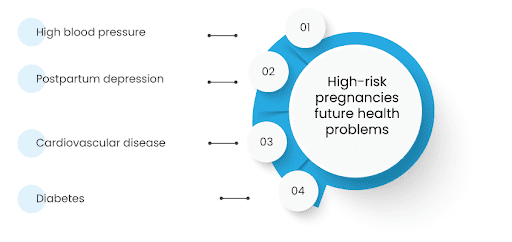Introduction
However, A high-risk pregnancy entails a variety of common conditions that might pose health risks for the baby, the mother, or both. Hence these conditions might be related to your pre-existing health conditions before becoming pregnant or developing them. So such pregnancies need special care and close monitoring throughout the pregnancy period. No matter your age or three words from your obstetrician, a high-risk pregnancy can turn your world upside down. This article will help you know about a high-risk pregnancy and what you should be concerned about to prepare you for your upcoming beautiful pregnancy journey.
Our Wellness Programs
What is a high-risk pregnancy?
Hence certain health conditions, including age, thyroid, high blood pressure, etc., can make a straightforward pregnancy high risk. During this kind of pregnancy, you will need constant monitoring to reduce the possibility of any complications.
However, if you have a high-risk pregnancy, rest assured that it doesn’t always mean that you or your unborn baby will have problems. Several women with high–risk pregnancies have experienced healthy and normal labour and delivery. Have faith!
Looking for services related to this subject? Get in touch with these experts today!!
Experts

Banani Das Dhar

India
Wellness Expert
Experience: 7 years

Devika Gupta

India
Wellness Expert
Experience: 4 years

Trupti Rakesh valotia

India
Wellness Expert
Experience: 3 years

Sarvjeet Kumar Yadav

India
Wellness Expert
Experience: 15 years
What is the age of high-risk pregnancy?
Generally, there are two kinds of high-risk pregnancy ages. They are:
- If you are above 35 and planning to get pregnant for the first time, you might face more complications than younger mothers. Such complications may include early loss of pregnancy or health conditions like gestational diabetes.
- Mothers under 17 can also have a high-risk pregnancy for anaemia, increased chance of premature labour or birth, sexually transmitted diseases (S.T.D. s), infections (S.T.D. s), etc.
What are the problems that arise in a high-risk pregnancy?
Before planning your pregnancy, start practising the habit of proper nutrition along with a healthy lifestyle, as prescribed by your obstetrician. Although there are several causes of high-risk pregnancy, good prenatal care can help you prevent it significantly. However, few cases are more severe than the others and need thorough monitoring and constant medical support.
High-risk pregnancies experience the following symptoms:
If you have a high-risk pregnancy and experience any following symptoms, contact your obstetrician without any delay.
- Abnormal and persistent abdominal pain
- Extreme fatigue
- Chest pain
- Persistent dizziness
- Incidence of fainting
- An unborn baby’s movement gets slowed or stopped.
- Fever over 100.4 °F.
- Excessive vomiting and nausea apart from normal morning sickness
- Any pain, swelling or redness in your body
- Excessive depression
- Troubled breathing
- Abnormal vaginal bleeding or discharge
Considering high-risk pregnancies, getting early and thorough prenatal care is crucial. Consult with a good obstetrician and tell him all about your medical history and past complications if you think motherhood.
What are the causes of a high-risk pregnancy?
So several causes of high-risk pregnancy may develop either before you get pregnant or during your pregnancy period or delivery. Although we will give you a possible list of factors that could cause a high-risk pregnancy, remember it is not an all-inclusive list. Each pregnancy is different; any specific risk for one pregnancy may pose no chance.
Doctors classify the following as a high-risk pregnancy:
- Pre-existing health conditions like high blood pressure, diabetes, thyroid, depression, etc.
- Health conditions related to pregnancy
- Lifestyle factors such as smoking, drug addiction, alcohol abuse etc
- 35 or above years of age and under 17 at the time of pregnancy
- Underweight or overweight before conceiving
- Pregnancy with twins, triplets, or other multiples
- Problematic earlier pregnancy, like premature labour, a child with a genetic abnormality or congenital disability, etc.
If your pregnancy is high-risk, you must constantly keep in touch with your obstetrician and follow every measure and precaution.
What are the Effects of a high-risk pregnancy?
A high-risk pregnancy can be life-threatening for the pregnant mother, unborn child, or both. High-risk pregnancies include severe complications.
1. Severe complications
- Preeclampsia or high blood pressure at the time of pregnancy
- Eclampsia or seizure at the time of pregnancy
- Preterm delivery
- Cesarean delivery or C-section
- Excessive bleeding during labour, delivery or after birth
- Lower or higher birth weight
- Congenital disabilities or problematic genetic conditions in the unborn baby
- Increased chances of Neurodevelopmental deficits in the fetus
- Miscarriage
- Stillbirth
- Gestational diabetes
-
However, mothers with high-risk pregnancies may not experience problems and deliver healthy babies. But in such cases, they may be at a higher risk for future health problems.

- High blood pressure
- Complicated future pregnancies
- Postpartum depression
- Cardiovascular disease
- Stroke
- Diabetes
3. High-risk pregnancies can also affect a child in the following way,
- Behavioural disorder
- Neurological disorders
- Breathing trouble
- Gastrointestinal issues
- Delay in growth and development
- Poor mental health conditions
- Obesity
- Diabetes
- Vision or hearing impairment
What is the treatment for high-risk pregnancies?
However, treatment of this or its management depends on the specific risk factors involved in each case and the patient’s medical history. Some care plans may include the following,
- Constant and close follow-up with an obstetrician throughout pregnancy
- Consultation with a maternal-fetal medicine doctor who specialises in high-risk pregnancy
- Talk with other medical specialists if needed
- Ultrasounds and more immediate fetal evaluation at regular intervals
- Constant blood pressure monitoring
- Constant blood sugar monitoring
- Regular administration of prescribed medicines by the obstetrician
Moreover, to reduce the risk of pregnancy complications
1. Avoid drugs, alcohol or smoking.
- Before planning a pregnancy, identify your potential health risks by consulting with a doctor.
- Maintain a healthy body weight before and during the pregnancy
- If you take any long-term medications, make sure they are safe to take during your pregnancy too
- Practice safe sex
- Avoid stress and check your mental health
Some laboratory tests to monitor your health along with your unborn baby in case of high-risk pregnancy
- Blood and Urine test: To check for any genetic conditions or congenital abnormalities in the baby.
- Ultrasonography: To screen congenital disabilities in the baby via images
- Biophysical profiling: To ensure that the unborn baby gets enough oxygen via monitoring their breathing, movements, amniotic fluid and heart rate.
Conclusion
However, if you are having a high-risk pregnancy, do not get worried. Hence it simply means that in your case, you and your unborn baby may need extra care during pregnancy and after birth. So ensure you get through every prenatal care as prescribed by your obstetrician. Now, no matter how small a problem, do not hesitate to communicate with your healthcare provider to avoid pregnancy complications regularly. Also, if you need someone to talk to while going through the emotional journey of pregnancy, reach out to your nearest counsellor or therapist.
















